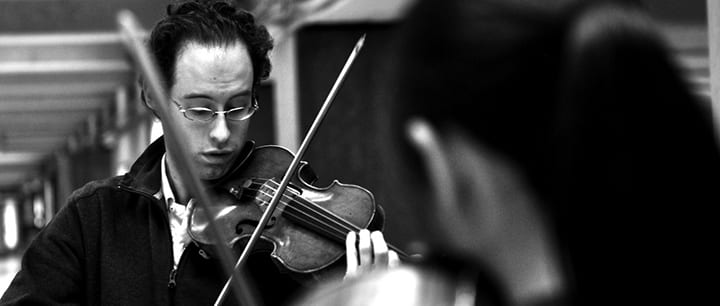 Learning to play in front of an audience can be tough, but playing for an audition can be one of the most nerve-wracking experiences, especially your first time around. There are many violin playing tips to help you learn how to play, and how to listen to others in the orchestra, but many of those tips do not apply to an audition. No matter how good you are, nerves can be a huge factor.
Learning to play in front of an audience can be tough, but playing for an audition can be one of the most nerve-wracking experiences, especially your first time around. There are many violin playing tips to help you learn how to play, and how to listen to others in the orchestra, but many of those tips do not apply to an audition. No matter how good you are, nerves can be a huge factor.
Unlike a concert where the audience is inclined to praise you because they are there to enjoy the music, an audition involves a panel that is there specifically to judge your skills. Figuring out how to play under these circumstances is an individual experience, but there are a few universal violin playing tips that can lessen the apprehension and tension of an audition.
Early Preparation
First, take the time to determine exactly what is required of you. You may be asked to demonstrate specific techniques, or play a particular piece. If you know that you want to get into a certain school or class level, take the initiative now to go over this information.
As you practice leading up to the audition, make sure to spend some time actually visualizing your performance. Of course, the actual experience will be different, but placing yourself in that frame of mind will help you when the time comes. Once you have set up the scenario in your mind, start playing.
Setting Up
Some auditions require you memorize your music, others allow you to use a music stand, and you may be asked to play standing up or sitting down. Before you play, make sure you’re both physically and mentally prepared.
Make sure you’re in a comfortable position, especially if you have to stand. Take several deep breaths, fully inhaling and exhaling the air. You can do this with your eyes open or closed, but either way make sure you are focused only on your breathing. This sets up your mind, forcing you to pay attention to your body.
Pay attention to your shoulders, also. If you feel them getting tense, take a couple of extra breaths and relax. The more relaxed you are, the less nervous you will be. This is particularly important for your bow arm, because if it is tense, you can lose mobility and range of volume. Just like one of the first violin playing tips you learn, your bow hand should be remain relaxed.
During the Audition
As you begin your audition, return to what you visualized during your practice sessions. Of course, most of the room and people will look different than you had visualized, but you are turning to your mind’s eye. By focusing on something that is familiar, your body will react instinctively, and you’ll be more likely to play like you did while practicing.
Keep your posture as steady as possible so that your arms are able to move as needed. You left hand needs to be able to move freely, which it cannot do if you start to slump in the middle of the song. Shifting your right leg can interfere with your bow hand. Of course, you don’t want to be completely stiff, as that will cause discomfort, but do be aware of what your arms and back need.
Again, keep your shoulders relaxed. During a long rest or break, take the time to make sure your shoulders are not tensing up. The more relaxed your shoulders, the better your bowing and fingering will be.
Every audition is different, and it can be difficult to fully prepare for playing the violin knowing that you are being assessed. No one set of violin playing tips will work for everyone, particularly when you are trying to get into the best class or school. The most important thing is not to let the final results discourage you too much. Even if you don’t do as well as you wanted, learning from the experience will improve your performances in the future. Regardless of the result, treat every audition as a way to improve. Good luck!
Photo by screaming_monkey
Suzy S.

